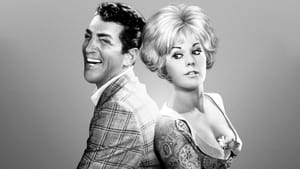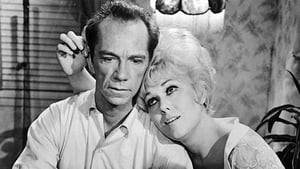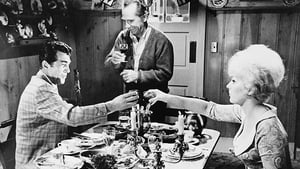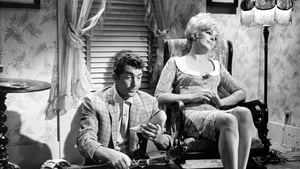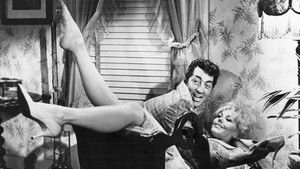Video Sources 0 Views
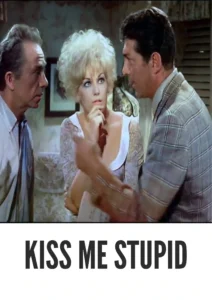
Synopsis

Prepare for a riotous and risqué romp with Kiss Me Stupid, a daring comedy from 1964, now delightfully colorized to bring its zany humor to life. Directed by Billy Wilder and featuring a star-studded cast including Dean Martin and Kim Novak, this film serves up a смешно blend of marital misunderstandings, small-town antics, and celebrity satire. Perfect for fans of classic comedies and those who appreciate a bit of daring humor, this HD download offers a fresh and vibrant take on a controversial classic.
Kiss Me Stupid unfolds in the sleepy town of Climax, Nevada, where struggling songwriter Orville Spooner (Ray Walston) lives with his wife, Zelda (Felicia Farr). Orville is convinced that his songs will never be successful unless they are sung by the famous crooner Dino (Dean Martin), a thinly veiled parody of Martin himself.
When Dino’s car breaks down in Climax, Orville sees his chance. He and his jealous friend, Barney Millsap (Cliff Osmond), conspire to keep Dino in town long enough to pitch him Orville’s songs. Their scheme involves convincing Dino that Zelda is having an affair and hiring Polly the Pistol (Kim Novak), a waitress from a local bar, to pose as Orville’s wife.
As the night progresses, chaos ensues as everyone tries to keep up the charade. Dino, thinking he’s seducing Orville’s wife, becomes increasingly interested in the songs. Meanwhile, Orville struggles to maintain control of the situation while battling his own insecurities and desires. The film is a whirlwind of mistaken identities, double entendres, and over-the-top performances, making it a truly unforgettable comedic experience.
The film boasts a stellar cast, each delivering memorable performances:
-
Dean Martin as Dino
-
Kim Novak as Polly the Pistol
-
Ray Walston as Orville Spooner
-
Felicia Farr as Zelda Spooner
-
Cliff Osmond as Barney Millsap
Kiss Me Stupid is a screwball comedy with elements of satire, romantic comedy, and farce. It blends witty dialogue, slapstick humor, and daring subject matter to create a unique and entertaining experience.
Released in 1964, Kiss Me Stupid reflects the changing landscape of American comedy. Billy Wilder, known for his sharp wit and willingness to tackle controversial subjects, pushed the boundaries of what was acceptable in mainstream cinema. Kiss Me Stupid, with its suggestive themes and satirical portrayal of celebrity culture, sparked debate upon its release. Despite the controversy, the film remains a significant work in Wilder’s filmography, showcasing his comedic genius and his willingness to challenge societal norms.
This colorized version of Kiss Me Stupid has been meticulously restored using modern digital techniques, enhancing the visual appeal while preserving the film’s original charm and atmosphere. The colorization process involved a detailed analysis of the grayscale tones in the original black and white footage, with careful attention paid to assigning appropriate colors to each scene. While the specific software used remains confidential, the methods employed included advanced algorithms for color palette selection, motion compensation, and image enhancement. This painstaking process breathes new life into the characters and settings, making the story even more engaging for modern audiences. While the decision to colorize classic films is sometimes debated, it introduces these films to a wider audience, ensuring their lasting appeal for generations to come.
-
: Billy Wilder
-
: Billy Wilder & I. A. L. Diamond
-
: Joseph LaShelle
-
: Daniel Mandell
-
: The Mirisch Corporation
-
: United Artists
-
: 125 minutes
-
: MP4
-
: HD (1080p)
-
: Compatible with most devices, including smartphones, tablets, computers, and smart TVs.
Kiss Me Stupid (1964) has had a complex critical reception, with some praising its daring humor and satirical edge, while others have criticized its risque subject matter. Despite the mixed reviews, the film remains a fascinating and thought-provoking work, showcasing Billy Wilder’s unique comedic vision. As a controversial but endlessly entertaining film, Kiss Me Stupid offers a glimpse into the changing attitudes towards sex and morality in the 1960s.
-
: What is Kiss Me Stupid about?
-
A: Kiss Me Stupid is a screwball comedy about a struggling songwriter who tries to get his songs to Dean Martin by hiring a waitress to pose as his wife.
-
-
: Is Kiss Me Stupid (1964) a well-known film?
-
A: Kiss Me Stupid is known both for its comedic elements and the controversy it generated upon its release.
-
-
: Is this version of Kiss Me Stupid colorized?
-
A: Yes, this version has been professionally colorized to enhance the viewing experience.
-
-
: What makes Kiss Me Stupid interesting for classic film fans?
-
A: Kiss Me Stupid offers a glimpse into the daring humor and social commentary of Billy Wilder, with a stellar cast.
-
-
: What is the download format?
-
A: The download format is MP4, which is compatible with most devices.
-
-
: What resolution is the download?
-
A: The resolution is HD (1080p), providing a high-quality viewing experience.
-
Watch Kiss Me Stupid Today!
